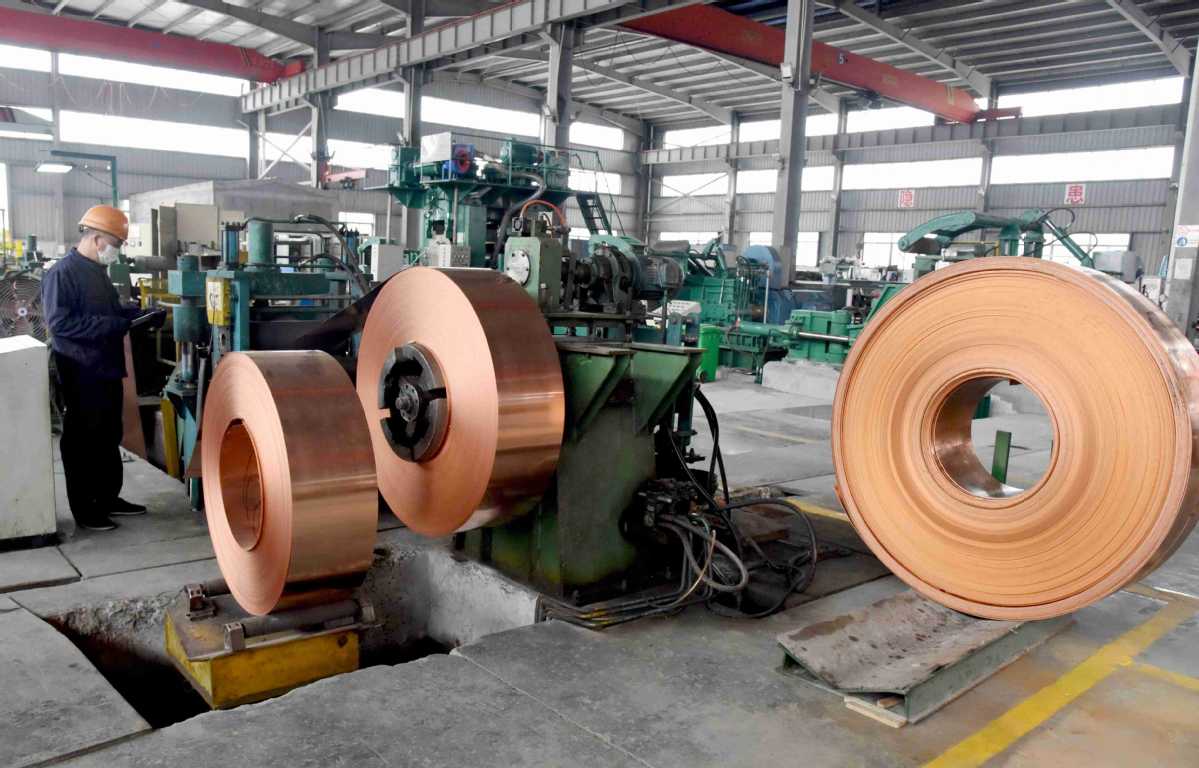Chile closure will not derail metal supplies


Border shutdown only a short-term shock for Chinese firms, say experts
The COVID-19-related month-long border shutdown in Chile, a major producer of metals, is unlikely to crimp raw material supplies for Chinese companies and will have a mild impact on the country's inflation risks, experts said on Thursday.
Chile, the world's top supplier of copper and second-largest lithium producer, has decided to shut its borders from Monday to May 1 to contain a new wave of COVID-19 cases, stoking concerns that metal exports will be restricted and further fuel a rally in international commodity prices.
Copper for delivery in May, for instance, jumped by 3.7 percent to $4.1375 per pound on the Comex market in New York on Monday as traders grappled with the border closure, before retreating to about $4.08 per pound as of Thursday afternoon in Beijing, according to market tracker Investing.com.
Channel Yeung, a China market analyst at FXTM, a United Kingdom-based global trading platform, said the border closure will not take a heavy toll on Chile's metal exports as the Chilean government and the country's leading copper miner have confirmed that sea transport and mining operations will continue.
"Therefore, the border closure should not lead to a substantial shortage in copper and lithium. This short-term shock has nevertheless catalyzed the recent price surge, indicating that global demand for the metals is still strong," Yeung said.
The border closure will not affect sea transport or the normal operation of mines, Chile's energy and mining ministry said on Monday, while Codelco, the world's biggest copper producer based in the country, said the border closure will not affect its operations or shipments, Bloomberg reported.
Demand-side factors are instead expected to be the main driving force for metal prices, Yeung said, citing the massive infrastructure stimulus in the United States, China's steady economic recovery, and a worldwide emphasis on developing new energies and electric vehicles that use copper and lithium as raw materials.
For China, rising commodity prices would mean imported inflationary pressure, which, along with the pent-up consumer demand, may push up prices, he said.
"But China's inflation is still expected to remain mild in the coming months and the policy stance of the Chinese central bank is unlikely to see any sharp turns,"Yeung said, given that the country's grain prices are expected to remain stable while pork prices continue to decline.
China is scheduled to release its inflation figures for March on Friday. Analysts polled by Wind Info expect the country's growth in consumer price index, a main gauge of inflation, to remain low at 0.2 percent on a yearly basis in March. The producer price index, which measures factory-gate prices and is more closely correlated with international commodity prices, is expected to grow by 3.3 percent in March, up from 1.7 percent in February.
Though any major inflationary risk is at bay in China, experts said Chinese metal smelters and manufacturers could still face some pressure due to the tightness in raw material supplies as the border closure has indicated that pandemic-related uncertainties are still exist.
"We can't expect the border closure alone to stoke copper prices based on current information. The event is rather heightening the supply risks, particularly copper, as Chile is the world's top copper miner," said Yao Wenyu, a senior commodities strategist at Dutch bank ING.
"It also acts as a fresh reminder that the supply chain remains fragile due to COVID-19," Yao said.
Yao also said that the existing tightness in the copper concentrate supply has pushed treatment charges paid to the Chinese smelters to a multiyear low, squeezing margins of companies.
Rising prices of copper, as well as other metals, have also been felt by Chinese downstream manufacturers as seen in the higher PPI growth, she said, adding that high copper costs have prompted some home appliance producers to hike product prices.




































